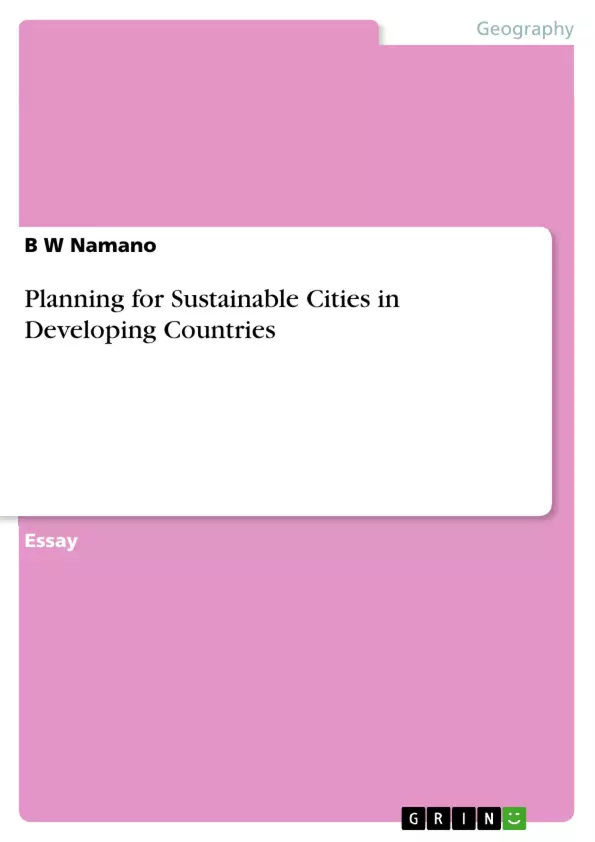This essay discusses the topic of planning sustainable cities in developing countries. The aspects of economy, ecology and social cohesion are examined and challenges to creating sustainable cities are discussed.
Inhaltsverzeichnis (Table of Contents)
- Planning for Sustainable Cities in Developing Countries
- What is a developing country?
- Key Principles for Sustainable Cities
- Nairobi: A Case Study
- Sustainability in Practice: The NIUPLAN
- Integrated Planning
- Planning with Partners and Stakeholders
- The Subsidiarity Principle
- Market Responsiveness
Zielsetzung und Themenschwerpunkte (Objectives and Key Themes)
This paper examines the challenges and opportunities of planning for sustainable cities in developing countries. It explores the key principles for managing modern human settlements, using the example of Nairobi, Kenya, to illustrate the implementation of these principles in a practical context.
- Sustainable Development
- Integrated Planning
- Good Governance
- Market Responsiveness
- Subsidiarity
Zusammenfassung der Kapitel (Chapter Summaries)
- Planning for Sustainable Cities in Developing Countries: This chapter introduces the concept of sustainable cities and the importance of planning for their development in developing countries. It explores the characteristics of developing countries and the challenges they face in urban development.
- What is a developing country?: This chapter delves into the definition of developing countries, comparing them with developed countries and highlighting the unique challenges they encounter.
- Key Principles for Sustainable Cities: This chapter outlines ten key principles for managing modern human settlements as presented in the 'Reinventing Planning' paper, emphasizing the importance of sustainability, integration, partnerships, and inclusiveness.
- Nairobi: A Case Study: This chapter uses the example of Nairobi, Kenya, to illustrate the application of these principles in a real-world context. It introduces the Nairobi Integrated Urban Development Master Plan (NIUPLAN) and its potential for guiding the city's sustainable development.
- Sustainability in Practice: The NIUPLAN: This chapter explores the sustainability goals of the NIUPLAN, examining its six key sector constraints and planning issues, including land use, urban transport, and infrastructure.
- Integrated Planning: This chapter focuses on the importance of integrated planning, where different sectors of development are interconnected and coordinated through sound institutional frameworks and policies.
- Planning with Partners and Stakeholders: This chapter examines the role of partnerships and stakeholders in urban planning, highlighting the importance of inclusive decision-making, transparency, and accountability.
- The Subsidiarity Principle: This chapter explores the principle of subsidiarity, emphasizing the roles and responsibilities of national and local governments in urban development.
- Market Responsiveness: This chapter discusses the importance of market responsiveness in urban planning, emphasizing the need to create opportunities, promote resilience, and address the needs of the informal sector.
Schlüsselwörter (Keywords)
Key terms and concepts explored in this paper include sustainable cities, developing countries, integrated planning, good governance, market responsiveness, subsidiarity, stakeholder engagement, Nairobi Integrated Urban Development Master Plan (NIUPLAN), and Kenya Vision 2030.
Frequently Asked Questions
What are the key principles for sustainable cities?
The paper outlines principles such as integrated planning, good governance, market responsiveness, subsidiarity, and inclusive stakeholder engagement.
What is the NIUPLAN in Nairobi?
The Nairobi Integrated Urban Development Master Plan (NIUPLAN) is a framework designed to guide the city's sustainable development and infrastructure growth.
How does the subsidiarity principle apply to urban planning?
It emphasizes that decisions should be made at the most local level possible, defining the roles of both national and local governments in development.
What challenges do developing countries face in city planning?
Challenges include rapid urbanization, infrastructure constraints, land use issues, and the need to integrate a large informal sector into the economy.
Why is stakeholder participation crucial for sustainability?
Inclusive decision-making ensures transparency, accountability, and that the needs of all citizens are considered, leading to more resilient urban environments.
- Citation du texte
- B W Namano (Auteur), 2014, Planning for Sustainable Cities in Developing Countries, Munich, GRIN Verlag, https://www.grin.com/document/307585



